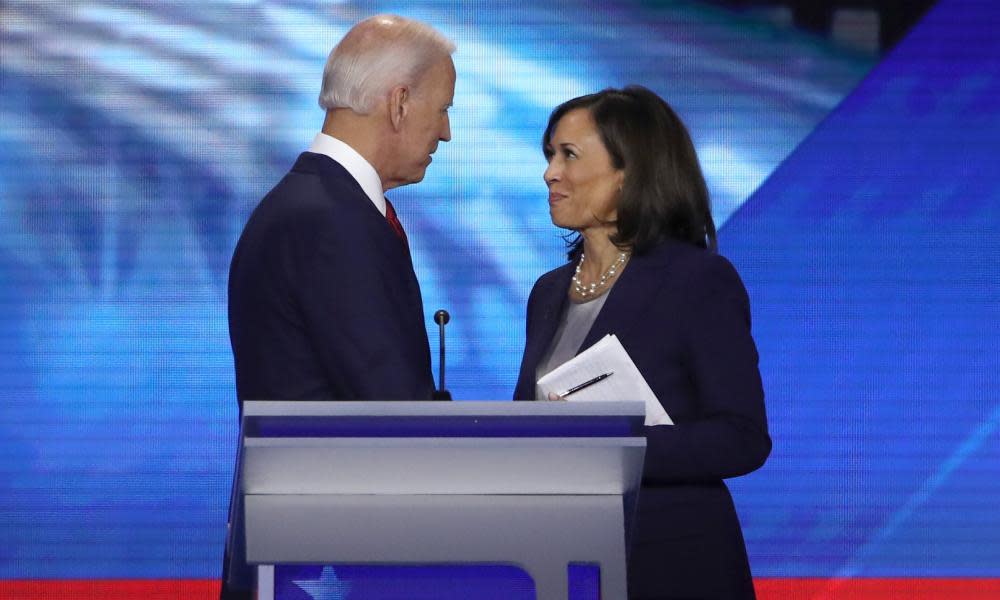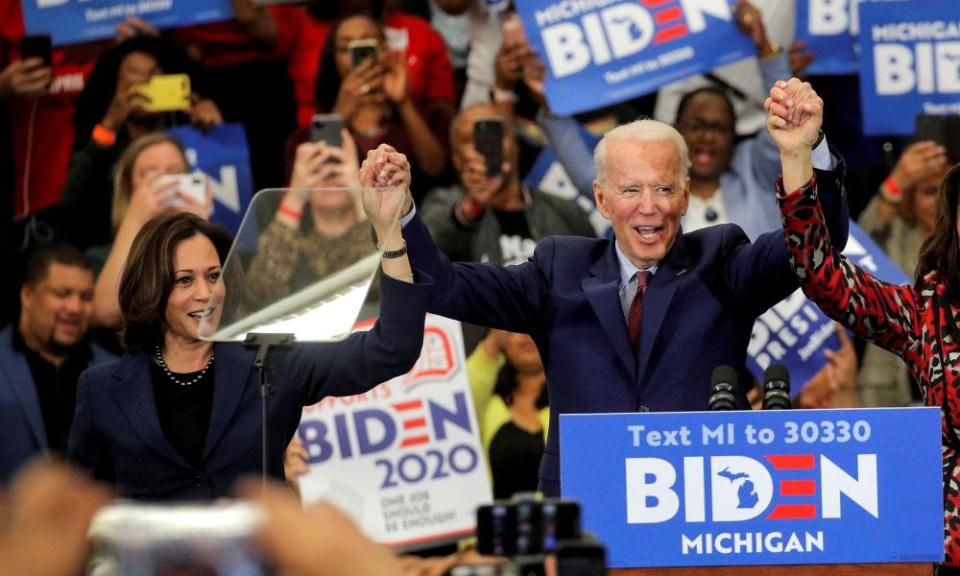In choosing Kamala Harris, Biden may have found the anti-Trump

Joe Biden may have just chosen the anti-Trump as his running mate – and, if he wins, as his successor.
The selection of California senator Kamala Harris for the Democrats’ vice-presidential nomination puts a woman of colour on a major party ticket for the first time in America’s 244-year-old history.
Related: Kamala Harris: trailblazer who went from Joe Biden’s rival to running mate
It also comes loaded with symbolism in an era that has seen the election of a president roared on by white supremacists, the dawn of the #MeToo movement and a mass uprising for the cause of Black Lives Matter. Tuesday shows how the picture is changing.
“It makes it look more like America,” Eugene Robinson, a newspaper columnist, told the MSNBC network. “It makes it more like the America that we are becoming than the other party which looks more like the America we once were, or the America that many think we once were.”
Just when it seemed the contrast between these national visions could not be more vivid, it became even more so. The moment of racial reckoning became even more acute.
And given Biden’s age – he will be 78 years old on inauguration day – and his lack of clear commitment to serving a second term, Harris is now better placed than anyone to be America’s first female president, a glass ceiling that Hillary Clinton did not manage to shatter in 2016.
That is why this vice-presidential pick is way more important than usual. John Adams, the first person to hold the job, called it “the most insignificant office that ever the invention of man contrived or his imagination conceived”. John Nance Garner famously said it “is not worth a bucket of warm spit”. Walter Mondale said: “The office is handmade for ridicule and for dismissal. In the nature of it, you always look like a supplicant, a beggar, a person on a string.”

Clinton’s choice in 2016, Tim Kaine, was no game changer. She has said her three considerations for choosing a running mate were someone ready to take over as president; a governing partner she was comfortable with; someone who could help her win the election.
With hindsight, she may have got those priorities in the wrong order. After four years of Donald Trump and his mishandling of the coronavirus pandemic at a cost of tens of thousands of lives, Democrats understand that winning is everything. That will have figured prominently in Biden’s thinking, despite his insistence on finding someone with whom he is “simpatico”.
As a candidate, Harris’s strengths are formidable and her weaknesses are relatively slight. Her legal career means she is well placed to prosecute the case against Mike Pence in the vice-presidential debate in October and against Trump’s administration in general.
She has demonstrated this skill during congressional hearings, notably grilling the president’s highly controversial supreme court nominee Brett Kavanaugh, and even in debates against Biden himself. Trump cited both incidents at a White House briefing on Tuesday, branding Harris as “nasty”, echoing the “nasty woman” phrase he used about Clinton in 2016. But he has, so far, failed to come up with a disparaging nickname for her.
Her career as a former prosecutor also goes some way to neutralising Trump’s “law and order” campaign theme, which seeks to portray Biden and Democrats as soft on crime. And despite hailing from “coastal elite” California, Harris is less vulnerable than a choice such as the progressive senator Elizabeth Warren would have been to the Republican critique that Biden is a Trojan horse for the radical left.
Biden performed strongly among African American voters during the Democratic primary but continues to make gaffes, saying in May: “If you have a problem figuring out whether you’re for me or Trump, then you ain’t black.”
Democrats will be hoping that Harris’s historic candidacy dampens such concerns. Like Barack Obama, she is mixed race (her father from Jamaica, her mother from India), spent part of her childhood abroad (in Canada), protested against apartheid in South Africa and became a lawyer and then a Democratic senator.

She has seen the world through eyes that no white man can. In her memoir, The Truths We Hold: An American Journey, Harris describes how her mother became conditioned to discrimination at airport customs because of her accent and skin colour. So when Harris and her husband, Doug Emhoff, who is white, first went through customs together, her muscle memory kicked in, she writes.
“I was preparing myself in the usual way, making sure we had everything just right and in order. Meanwhile, Doug was as relaxed as ever. It frustrated me that he was so casual. He was genuinely perplexed, innocently wondering, ‘What’s the problem?’ We had been raised in different realities. It was eye-opening for us both.”
Harris’s selection offers a measure of redemption for Democrats who, after holding the most diverse primary race in history, still went for the septuagenarian white guy. The defeat of Harris and others was a bitter blow for many in a party that has declared Black women to be its “backbone”.
Now, as Trump leans into white identity politics, Democrats believe that Harris will maximise the turnout of female and African American voters, not least in critical swing states such as Michigan, Pennsylvania and Wisconsin, where a dip in Black turnout last time cost Clinton dearly.
But this will be a stress test for Democratic party unity. Harris can be seen as being to the left of Biden, but that is not saying very much. Progressives have worried about her career as California’s attorney general, including her support of an initiative that threatened the parents of repeatedly truant schoolchildren with prison sentences.
So far, however, the Democrats have done a better job than in 2016 of putting their differences to one side, such is the existential threat posed by Trump. They will know that in voting for Biden-Harris in 2020, they may well be voting for Harris in 2024.
“The Democrats now have a presidential ticket that reflects the American people better than the GOP ticket and every presidential ticket in US history,” tweeted the historian and author Ibram X Kendi. “It’s not everything. It’s not the crushing of racism + sexism. It’s not the freeing of Black womanhood. But it can be the start.”

 Yahoo News
Yahoo News 
